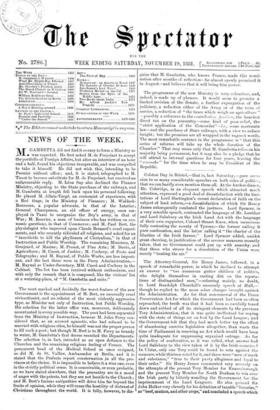Tile programme of the new Ministry is very colourless, and,
indeed, is made up of phrases. It would seem to promise a limited revision of the Senate, a further expurgation of the judiciary, a reduction either of the Army or of the term of service, a reduction of " the taxes which weigh on agriculture " —possibly a reference to the contribution font i■!re, the heaviest direct tax on the peasantry—some kind of poor-relief, the " strict application of the Concordat"—i.e., some mortmain law—and the purchase of State railways, with a view to reduce freight ; but the promises are all wrapped in the vaguest words. The most remarkable sentence in the programme is " that this series of reforms will take up the whole duration of the Chamber." That may mean only that M. Gambetta relies on his majority being permanent, but it may also be a pledge that he will attend to internal questions for four years, leaving the "revanche" for the time when he may be President of the Republic.






































